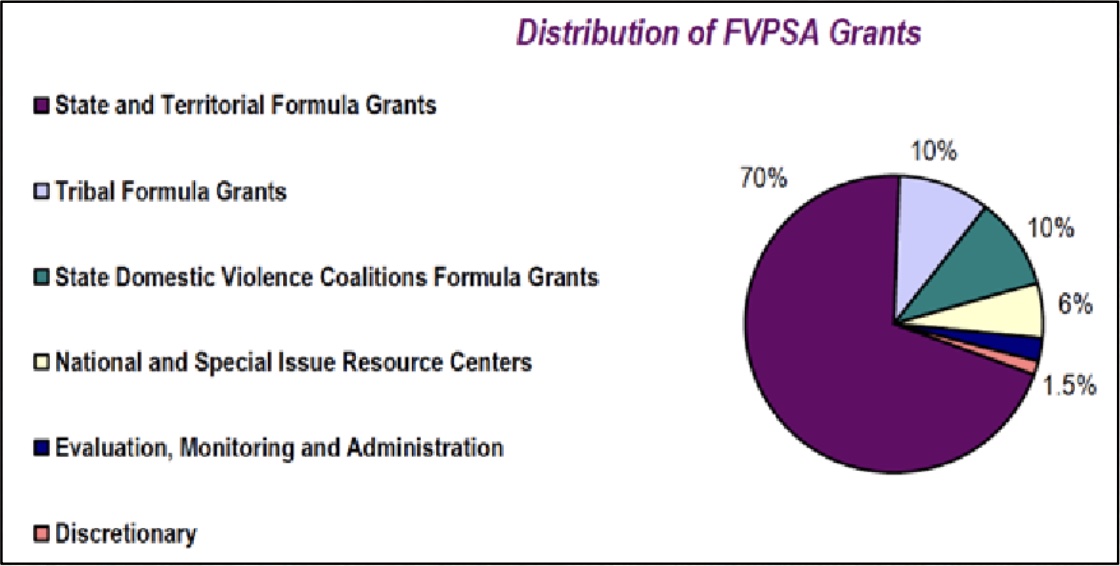Family Violence Prevention and Services Act
BATTERED WOMEN’S GRASSROOTS MOVEMENT
The battered women’s grassroots movement of the 1970’s helped to end the silence and begin addressing the injustices that victims of domestic violence have faced in the U.S. The movement’s purposeful engagement with local, state, tribal and the federal governments have resulted in changes in laws, policies and social norms over the past 45 years.
Engagement by the grassroots movement seen in early federal events related to domestic violence included a consultation, “Battered Women: Issues of Public Policy” in 1978, during which Tillie Black Bear, a member of the Sicangu Lakota, and other advocates provided testimony to the U.S. Commission on Civil Rights and a series of Congressional hearings in 1983 and 1984. In 1984, the Family Violence Prevention and Services Act (FVPSA) was signed into law by President Reagan (PL 98-457). FVPSA has since been reauthorized seven times, including twice as part of the Violence Against Women Act (VAWA) and five times as part of the Child Abuse Prevention and Treatment Act (CAPTA), most recently in 2010 that expired Sept. 30, 2015 (PL 111-320). Based on the definition of domestic violence in the statute, domestic violence and intimate partner violence are used interchangeably.
BACKGROUND
FVPSA is the primary federal funding source dedicated to supporting immediate shelter and supportive services for victims of family violence, domestic violence, or dating violence and their dependents. Administered by the U.S. Department of Health and Human Services’ Administration for Children, Youth and Families, FVPSA supports these activities through state and tribal shelter programs, state domestic violence coalitions, training and technical assistance service providers and the National Domestic Violence Hotline.
OVERVIEW
Of the $135 million appropriated for FVPSA’s shelter and supportive services in 2015, $13.5 million in FVPSA formula grants were distributed based on population to more than 200 tribes in 26 states. Local tribal domestic violence programs served 30,452 victims of domestic violence and their children. This is 2.3 percent of clients served by FVPSA-funded programs. Ninety percent of adults served were female, and 10 percent were male.
Of the $135 million appropriated to FVPSA in 2015, over $94.5 million FVPSA formula grants were distributed based on population to every state, the District of Columbia, and five U.S. territories. FVPSA State and Tribal Grants fund close to 1,600 domestic violence shelters and 1,300 non-residential service sites. Each year, local domestic violence programs, including tribal programs, serve about 1.3 million victims of domestic violence and their children. 92.5 percent of the adults served were female, and 7.5 percent were male.
Distribution of FVPSA funding is as follows:

The legislation mandates that “not less than 10 percent” of the annual appropriation shall be used to support Indian tribes to achieve the purposes of the Act. FVPSA funds include support for emergency shelter, crisis hotlines, counseling services, victim assistance initiatives, and other similar services. Some of the FVPSA state fund requirements govern the FVPSA tribal funds.
With funding under FVPSA many Indian tribes have developed tribal programs to provide a spectrum of services, including: shelter; safety planning; counseling; legal services; child care and services for children; career planning; life skills training; community education and public awareness; and other necessities, such as clothing, food, and transportation. Yet, despite these advances, funding and services remain nonexistent for over one-half of all Indian nations. Given this lack of resources and the unaddressed high rates of domestic violence against Indian women, including 38% of victims needing necessary services but unable to receive any,1 Indian tribes and tribal coalitions strongly support both reauthorization of and an increase in FVPSA funding specifically to meet the unmet needs of tribal victims of domestic violence.
For more information, please go to the Family & Youth Services Bureau, U.S. Dept. of Health and Human Services.2
HOW FVPSA LINKS WITH OTHER FEDERAL LAWS
FVPSA is also linked with other federal laws as noted above. With the passage of the Violence Against Women Act in 1994, Congress broadened the federal response to domestic violence to provide additional resources for victim services and focus on the law enforcement and legal response to domestic violence and other crimes involving violence against women – sexual assault, dating violence, stalking, and for Indian tribes also sex trafficking. In addition, FVPSA includes victim assistance with accessing other federal and state financial assistance programs, including the Crime Victims Fund(CVF), created and authorized in 1984 under the Victims of Crime Act (VOCA) which has 2 programs – the Victim Compensation and Victim Assistance Formula Grants Programs, currently awarded to states and territories. In recent years, between 40-50% of victims served by these 2 programs were domestic violence victims.
NCAI Resolution Supporting FVPSA Reauthorization
During the Atlanta NCAI Annual convention in October 2014, the NCAI Task Force on Violence Against Women worked with tribal leaders, advocates, and tribal coalitions on Resolution #ATL-14-028,3 which supports reauthorization of FVPSA. The resolution included support for several important tribal amendments. The NCAI Task Force voted unanimously in support of the resolution that will provide direction to NCAI staff and the NCAI Task Force to work toward reauthorization of FVPSA.
NOW THEREFORE BE IT RESOLVED, that the NCAI does hereby resolve to support reauthorization of the Family Violence Services Protection Act and increased FVPSA funding under the Health Services Appropriations bill, and
BE IT FURTHER RESOLVED, that the NCAI does hereby resolve to support amendments to increase the tribal set-aside in FVPSA;
BE IT FURTHER RESOLVED, that the NCAI does hereby resolve to support amendments to the FVPSA to include Tribal Domestic Violence Coalitions;
BE IT FURTHER RESOLVED, that the NCAI does hereby resolve to support a National Native Hotline/ Helpline developed and run by Native advocates to provide information and culturally appropriate support and assistance to Native adult and youth victims of family violence, domestic violence, or dating violence.
Continued grassroots organizing and engagement with government officials is critical to effecting ongoing change and ending domestic violence.
For more information, please contact us at policy@niwrc.org.





